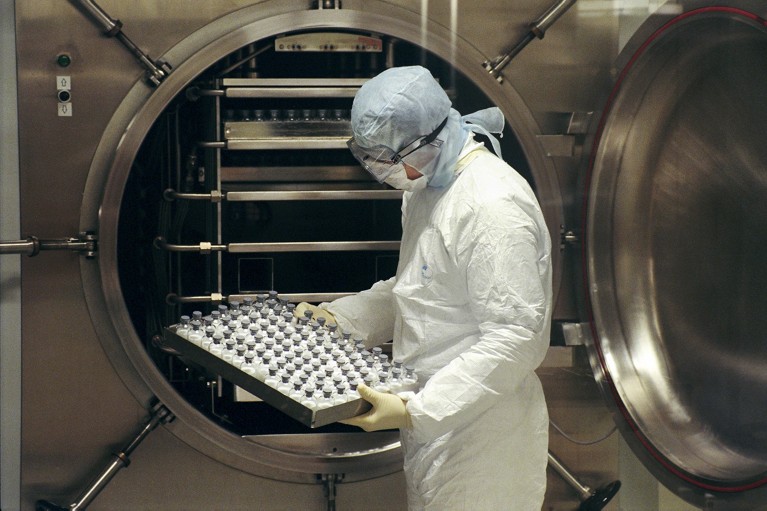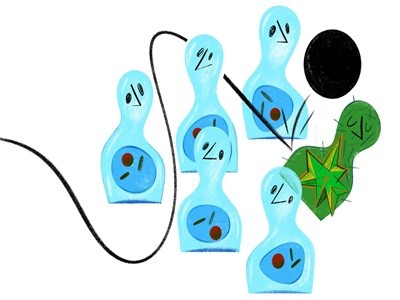
Evaluation of greater than 200 protein in blood supplies clues to danger of dying and greater than a dozen continual ailments related to ageing.Credit score: Vo Trung Dung/Look At Sciences/Science Photograph Library
An age ‘clock’ based mostly on some 200 proteins discovered within the blood can predict an individual’s danger of growing 18 continual diseases, together with coronary heart illness, most cancers, diabetes and Alzheimer’s illness.
The clock’s accuracy raises the prospect of growing a single take a look at that would describe an individual’s danger of many continual circumstances, says the mission’s lead scientist Austin Argentieri, a population-health researcher at Massachusetts Normal Hospital in Boston. “In the end, eager to reside longer will come all the way down to stopping continual ailments,” he says. The research was revealed in Nature Drugs on 8 August1.
Effectively-aged
An individual’s chronological age is essential to figuring out their danger of many age-related circumstances. However chronological age isn’t an ideal predictor of illness. Some 60-year-olds, for instance, are frail and have coronary heart illness, whereas others are the image of well being.
Argentieri and his colleagues sought to construct a ‘clock’ that may precisely replicate an individual’s illness standing. To take action, they used information from 45,441 folks, chosen at random, within the UK Biobank, a repository of biomedical samples. That pattern dimension is roughly 30 occasions bigger than that utilized in a earlier protein-clock research2, making it statistically extra highly effective.
Tips on how to kill the ‘zombie’ cells that make you age
The staff discovered that the degrees of 204 proteins precisely predict chronological age. Remarkably, when the authors constructed a second clock utilizing solely the 20 most indicative proteins, it predicted age nearly in addition to the 204-protein clock did. The 20 proteins included elastin and collagen, which make up the help construction between cells, and proteins concerned within the immune response and hormone regulation.
The clock additionally precisely predicted chronological age in two different teams of individuals: nearly 4,000 contributors to a biobank in China and nearly 2,000 contributors to a biobank in Finland. Earlier protein-based clocks checked out information from extra homogeneous populations, the researchers say.
Typically, age measured utilizing the protein clock was just like chronological age. However for some people, there was a niche between the 2 — reflecting the truth that protein ranges change as illness develops. Individuals whose protein-clock age was increased than their chronological age had been extra more likely to develop 18 continual ailments, together with diabetes; neurodegenerative circumstances; most cancers; and ailments of the guts, liver, kidney and lung. Protein-clock ageing was additionally linked with bodily frailty, slower response time and untimely dying.
Different folks’s proteins age extra slowly than the common. Whether or not that’s due to environmental components, genetics or a mixture is unclear. Of the ten% of individuals within the research who had been “the slowest agers”, Argentieri says, “lower than 1% developed dementia or Alzheimer’s”.
Turning again the clock?
Two of the research’s strengths are its giant information set and its profitable replication in numerous populations, says molecular epidemiologist Sara Hägg on the Karolinska Institute in Stockholm. “It’s a really strong research,” she says.
Argentieri and his colleagues need to add extra geographic and genetic variety to their coaching information. The limiting issue, says Argentieri, is the dearth of protein information in biobanks with numerous populations. The authors are additionally investigating using their protein clock to check whether or not new medical remedies stave off age-related illnesses “with out having to attend a decade or two to see if somebody develops a continual illness”, Argentieri says.
Lastly, they’re on the lookout for environmental and behavioural components that have an effect on how rapidly proteins age within the physique. “OK, you may inform me about my future danger for 18 totally different ailments,” says Argentieri. “However can I do something to vary that trajectory?”



